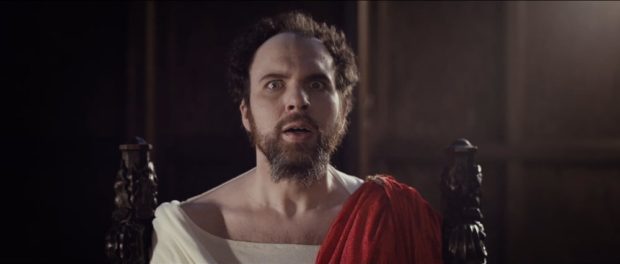Interview With Antigone Director Anton Golikov of Raise the Stakes
Raise the Stakes, an independent theatre company from Montreal, will be opening their production of the ancient Greek tragedy Antigone. The play has been adapted for centuries on end, yet director Anton Golikov is prepared to unveil his unique vision of this classic piece of theatre. I got the chance to work with Golikov years ago in Raise the Stakes’ production of Lunduntown. Being familiar with his methods, I was curious to see what he has in store.
Chris Aitkens (CA): Antigone will be Raise the Stakes’ 12th production. Looking back on your first couple years, how would you say the company has grown?
Anton Golikov (AG): The company has been giving opportunities to multidisciplinary artists since its inception. This is our biggest project yet, being set in a church, with a projectionist (Tricia Moore) lighting up the walls, a four-piece acoustic band providing accompaniment, and a cast with 16 actors. There are a lot of moving pieces, and this cast has truly come together with strong determination to create this piece of theatre.
CA: Raise the Stakes is no stranger to classic theatre, but this the first time your company has delved into Greek theatre. What brought about this decision?
AG: Greek theatre steps out of the realm of average experience and really dramatizes the impact of the spoken word. There is a frantic action in tragedy, where all the characters struggle to keep pace with the events transpiring on stage (there will be blood.) This comes with very interesting challenges in the theatre. The actors must always be living in the present moment, and press on with urgency, in a public space. A chorus of Theban citizens acts as a liaison between the royal family’s palace intrigues on stage and the public sitting in the pews. To do ancient Greek theatre is to delve into a world that gave birth to democracy.
CA: What relevance does Antigone have to today’s society?
AG: In this play, Antigone disobeys King Creon who proclaims himself to be “the law” and immune to any challenge. She buries her brother Polynices in direct violation of the Creon’s edicts; it is natural law vs. the law of man. I think their confrontation touches upon the great social upheaval and the beginning of revolution in our modern time. Today, we are all suspicious of the people in power, their arrogance and their obstinate refusal to face facts. Women have come together to question the laws of the state and status quo, and will continue to do so. Anagnorisis, a term by Aristotle is defined as “a change from ignorance to knowledge, producing love or hate between the persons destined by the poet for good or bad fortune.” It is my hope that humanity is making course towards reconciliation.
CA: Having worked with your company in the past, I know that you encourage actors to develop their characters by taking inspiration from different sources other than the script. What kind of homework did you assign to the cast in preparation for Antigone?
AG: We had Dr. Lynn Kozak, professor of history and classical studies at McGill University come in and give the cast a talk about the structure of ancient Greek society, the socio-historical context of the play, and the time in which Sophocles had written the tragedy. Costumes and design have been extensively researched by Caitlin Ross and inspired by historical and classical art. The best barber in town, Steeve Pelletier, has been working alongside us as well to give us authentic Greek looking hair.
CA: What role does music play in this production? What was it like working with musical director Lloyd White?
AG: Lloyd is a wonderful artist with great musical sensibility. He’s a Bishops University graduate and specializes in jazz and composition. Although there is very limited information on the music of ancient Greece, we have made a live soundtrack which is a hybrid of classical modes and more modern impressionist elements. The music accompanies all the chorus speeches and accentuates the dramatic structure of the play. I am super excited that we have Jenny Rizzo playing a concert grand harp, Alex Lepanto on a wide range of percussion, Gideon Yellin playing the oud, and Lloyd himself on double bass.
CA: Tell me about the venue. How did you settle on putting the play in a church, instead of the theatre venues you have used in the past?
AG: Westmount Park United Church has a beautiful sanctuary space with large gothic columns and beautiful stone construction. It is the perfect venue to set this play in. We have lit it up to bring out the textures and architectural elements. The space will have a magical appeal to all audiences, it is truly sacred.
CA: Your directing approach claims to use traditional methods introduced by the Royal Shakespeare Company. What are your thoughts on their legacy now that both their co-founders, Peter Hall and John Barton, have recently passed?
AG: The influence of Shakespeare is apparent in all the work our company strives to do, and will continue to bring to the Montreal English theatre scene. We are true to the text, the rhythm, the pace and dismantling the notion of the fourth wall – we bring our audiences with us on the journey of the play. We seek the same intimacy and visceral connection inherent in every real moment experienced on the stage with our audience. There is a saying in the theatre that French actors perform with the breath and English actors perform with the heart. Our cast does both. See you there!
Antigone will run at the Westmount Park United Church from January 31st to February 17th. For tickets, go to Raise the Stakes’ website. For more information, go to the Facebook event.






